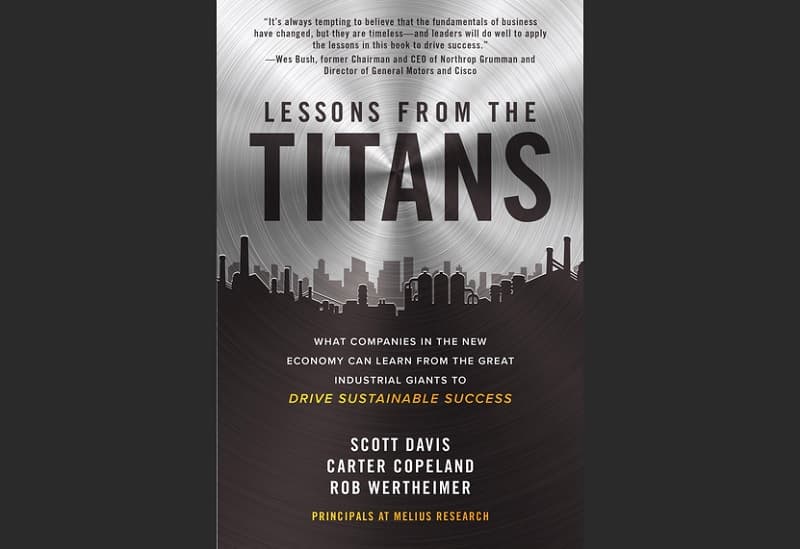Lessons from the Titans Summary
خلاصه کتاب درسهایی از تایتانها
1-Sentence-Summary: Lessons from the Titans tells the story of some of the biggest industrial companies in the United States and presents life-long strategies, valuable ideas, and mistakes to avoid for any business who wants to achieve long-term success.
خلاصه کتاب درسهایی از تایتانها در یک جمله: کتاب Lessons from the Titans داستان برخی از بزرگترین شرکتهای صنعتی در ایالات متحده آمریکا را روایت میکند و استراتژیهای مادامالعمر، ایدههای ارزشمند و اشتباهاتی را ارائه میدهد که هر کسبوکاری که میخواهد به موفقیت بلندمدت دست یابد، باید از آن اجتناب کند.
Favorite quote from the author:
نقلقول موردعلاقه نویسنده:
Starting up a business, scaling it, going through the ups and downs of an economy, all while staying relevant on the market is definitely one of the toughest jobs in the world. Still, some companies managed to pass the test of time and make a name for themselves, year after year.
راهاندازی کسبوکار، گسترش آن، گذر از فراز و نشیبهای اقتصادی، همگی در عین حال که مرتبط با بازار است، قطعا یکی از سختترین مشاغل در جهان است. با این حال، برخی از شرکتها موفق شدند آزمون زمان را پشت سر بگذارند و سال به سال شهرتی بیشتر برای خود دست و پا کنند.
Lessons from the Titans by Scott Davis, Carter Copeland, and Rob Wertheimer explores the secrets of such companies and how to start a business and scale it successfully, while also avoiding common mistakes and traps in the industry. From cost management to the organizational culture, every little detail matters.
کتاب درسهایی از تایتانها اثر اسکات دیویس، کارتر کوپلند و راب ورتایمر به بررسی اسرار شرکتها و چگونگی راهاندازی کسبوکار و گسترش موفقیتآمیز میپردازد؛ در حالی که از اشتباهات و تلههای رایج در صنعت نیز جلوگیری میکند. از مدیریت هزینه گرفته تا فرهنگ سازمانی، هر جزئیات کوچک آن دارای اهمیت است.
By learning from the top organizations in the US why some companies fail and some become highly successful, you’ll be able to assess yours better and turn it into a thriving entity. The first lesson is that everything starts from the top down.
با یادگیری از سازمانهای برتر در ایالات متحده آمریکا و این که چرا برخی از آنها شکست میخورند و برخی بسیار موفق میشوند، میتوانید شرکت خود را بهتر ارزیابی کنید و آن را به یک نهاد پر رونق تبدیل کنید. اولین درس این است که همه چیز از بالا به پایین شروع میشود.
Besides this one, here are three of my favorite lessons from the book:
- Companies that don’t have an open door policy from top down become fragile in time.
- Greed and creative accounting can deturn years of hard work and success.
- Increasing profits can happen by improving sales, cutting costs, and taking care of employees.
علاوه بر این یکی، در اینجا سه درس مورد علاقه من از کتاب آمده است:
۱. شرکتهایی که سیاست درهای باز از بالا به پایین ندارند به مرور زمان شکننده میشوند.
۲. حرص و طمع و حسابداری خلاق میتواند سالها تلاش و موفقیت را از بین ببرد.
۳. افزایش سود میتواند با بهبود فروش، کاهش هزینهها و مراقبت از کارکنان اتفاق بیفتد.
Now, let’s take a closer look at these lessons and learn about the ups and downs of running a company and how to turn it into a successful business.
اکنون، بیایید نگاهی دقیقتر به این درسها بیندازیم و در مورد فراز و نشیبهای اداره یک شرکت و چگونگی تبدیل آن به یک کسبوکار موفق بیاموزیم.
Lesson 1: An organizational culture that promotes exchanging opinions and pointing faults is the key to success
درس ۱: فرهنگ سازمانی که تبادل نظر و اشاره به ایرادها را ترویج میکند، کلید موفقیت شرکت است.
There were times when GE’s lights weren’t shining so bright and Boeing was facing major turbulences. When Welch became the CEO of GE in the 80s, he took a lot of risks. Some parts were justified and brought plenty of revenue in. However, the success may have gotten to his head.
زمانهایی بود که چراغهای جنرال الکتریک آنقدر روشن نمیدرخشیدند و بوئینگ با تلاطمهای بزرگی مواجه بود. هنگامی که وِلش در دهه ۸۰ مدیرعامل جنرال الکتریک شد، ریسکهای زیادی را متحمل شد. برخی از بخشها تعدیل شدند و درآمد زیادی به دست آمد. با این حال، موفقیت شاید او را مغرور کرده باشد.
GE formed two branches: the one focusing on its core business, and another one that acted more like a bank for its customers. They lent risky credits, issued bonds and credit cards, and spent money in other risky businesses. As a result, GE created a bubble ready to pop. However, management effectiveness couldn’t be questioned.
جنرال الکتریک دو شعبه تشکیل داد: یکی بر کسبوکار اصلی خود متمرکز بود و دیگری بیشتر شبیه به بانک برای مشتریان بود. آنها وامهای پرخطری دادند، اوراق قرضه و کارتهای اعتباری صادر کردند و پول خود را در سایر کسبوکارهای پرخطر خرج کردند. در نتیجه، جنرال الکتریک حبابی آماده برای ترکیدن ایجاد کرد. اگرچه، اثربخشی مدیریتی آن را نمیتوان زیر سوال برد.
The culture just didn’t permit it. The outcome? GE fell tremendously during the 2008 crisis. Luckily, Warren Buffett and the US government stepped in and saved it from bankruptcy. Boeing faced a similar story when they produced faulty 737 MAX airplanes that ended up crashing twice in 2019.
فرهنگ سازمانی اجازه نداد. نتیجه چه شد؟ جنرال الکتریک طی بحران سال ۲۰۰۸ بهشدت سقوط کرد. خوشبختانه وارن بافت و دولت آمریکا وارد عمل شدند و آن را از ورشکستگی نجات دادند. بوئینگ نیز زمانی که هواپیماهای معیوب مکس ۷۳۷ را تولید کرد که دو بار در سال ۲۰۱۹ سقوط کرد، با داستان مشابهی روبهرو شد.
The major issue reported by employees was that management was chasing profits and not listening to the workers when they encountered problems. With so much arrogance and so many deals with Wall Street on the table at the top, who was taking care of the core business and the employees? No one, therefore Boeing collapsed.
موضوع اصلی گزارششده توسط کارکنان این بود که مدیریت به دنبال سود بود و وقتی کارگران با مشکل مواجه میشدند به حرفهای آنها گوش نمیدادند. با این همه غرور و این همه معاملات روی میز با وال استریت، چه کسی از کسبوکار اصلی و کارمندان مراقبت میکرد؟ هیچکس. در نتیجه بوئینگ سقوط کرد.
Lesson 2: In the race for money and status, executives often forget about a company’s core value and purpose
درس ۲: در رقابت برای پول و موقعیت، مدیران اغلب ارزش و هدف اصلی شرکت را فراموش میکنند.
Nowadays, companies often promote workplace security, values, and principles at the core of their business, and hide their greed for profits. Let’s take the example of Boeing once again. Obviously, this company magnate dominates the market in their industry and has met tremendous success.
امروزه، شرکتها اغلب امنیت، ارزشها و اصول محل کار را در هسته کسبوکار خود ترویج میکنند و طمع خود را برای کسب سود پنهان میکنند. بیایید یک بار دیگر از بوئینگ مثال بزنیم. بدیهی است که این شرکت بزرگ بر بازار صنعت خود تسلط دارد و موفقیتهای چشمگیری نیز کسب کرده است.
Still, greed caught up with it, up to a point that Boeing’s executives were getting into shady deals with Wall Street, fixing books with the accounting department, pushing production just to meet targets, and keeping everything hidden from the public eye. Again, the fault begins with executives and the culture of canceling whistleblowers.
با این حال، حرص و طمع به آن دامن زد، تا جایی که مدیران بوئینگ در حال بستن قراردادهای مبهمی با وال استریت بودند، دفتر حسابداری را تنظیم میکردند، تولید را فقط برای رسیدن به اهداف تحت فشار قرار میدادند و همه چیز را از دید عموم پنهان نگه میداشتند. این بار هم تقصیر از مدیران اجرایی و فرهنگ لغو افشاگران شروع میشود.
فرهنگ لغو افشاگران: فرهنگی که به کارمندان یا افراد درگیر در یک سازمان اجازه صحبت و ارائه نظرات یا پیشنهادات را نمیدهد.
Greed plays a huge role in the downfall or dissolving of companies. Short-term profits can overshadow long-term prosperity and even cost lives. For example, in Boeing’s quest to compete with Airbus and push production of the 737 MAX, they deliberately failed to train pilots on the new features of the plane.
طمع نقش بزرگی در سقوط یا انحلال شرکتها دارد. سود کوتاهمدت میتواند رفاه بلندمدت را تحتالشعاع قرار دهد و حتی به قیمت جان انسانها تمام شود. به عنوان مثال، در تلاش بوئینگ برای رقابت با ایرباس و تولید مکس ۷۳۷، آنها عمدا نتوانستند خلبانان را در مورد ویژگیهای جدید هواپیما آموزش دهند.
Even worse, they didn’t even try to let them know about these changes. The result was hundreds of lost lives, two crashed airplanes in 2019, and a declining stock followed by negative figures. The lesson here is to never let short-term profits take over the bigger picture and shadow the core values of your company.
بدتر از آن، آنها حتی سعی نکردند خلبانان را از این تغییرات مطلع کنند. نتیجه آن، صدها جان از دست رفته، دو هواپیمای سقوط کرده در سال ۲۰۱۹ و کاهش سهام و به دنبال آن شروع ارقام منفی بود. درسی که در اینجا وجود دارد این است که هرگز اجازه ندهید سود کوتاهمدت تصویر بزرگتر را تحتالشعاع قرار دهد و ارزشهای اصلی شرکت شما را زیر سایه خود ببرد.
Lesson 3: Success comes with incremental changes, cutting costs healthily, and improving employee morale
درس ۳: موفقیت با تغییرات فزاینده، کاهش سالم هزینهها و بهبود روحیه کارکنان همراه است.
Some of the worst mistakes that CEOs of the biggest companies made revolved around greed, a profit-oriented mentality, not paying enough attention to the core values of their business, and doing too many changes at once. But now, let’s focus on the great deeds too!
برخی از بدترین اشتباهاتی که مدیران عامل بزرگترین شرکتها مرتکب شدند، حول طمع، ذهنیت سودمحور، عدم توجه کافی به ارزشهای اصلی کسبوکارشان و انجام تغییرات بیش از حد در آنِ واحد صورت گرفته است. اما اکنون، بیایید روی کارهای عالی شرکتها نیز تمرکز کنیم!
For starters, a great company is defined by employees. When a business takes care of its staff, the staff takes care of the customers. Although it sounds simple in theory, practice beats everyone to it. Then, there’s the profit part. This subject shouldn’t be taboo, yet it also shouldn’t be over-pushed.
برای شروع، یک شرکت عالی توسط کارمندان تعریف میشود. وقتی یک کسبوکار از کارکنان خود مراقبت میکند، کارکنان نیز از مشتریان مراقبت میکنند. اگرچه از نظر تئوری ساده به نظر میرسد، اما در عمل همه را با سختی روبهرو میکند. سپس، بخش سود شرکت وجود دارد. این موضوع نباید تابو باشد؛ اما همچنین نباید بیشازحد هم روی آن تمرکز کرد.
Profit is a result of cutting costs or increasing sales. When Welch took over GE, he made sure to do away with the unnecessary costs and let go of unwanted weights, and that was a good thing for the company.
سود، حاصل کاهش هزینهها یا افزایش فروش است. زمانی که وِلش مدیریت جنرال الکتریک را به دست گرفت، مطمئن شد که هزینههای غیرضروری را از بین میبرد و خرجهای ناخواسته را رها میکند و این یک کار خوب برای شرکت بود.
When Boeing decided to cut on steps in the manufacturing process and let go of quality control managers, that was the beginning of the company’s downfall. Such cost cuts are negative and shouldn’t normally occur. Instead, a great company focuses on increasing profits from sales or healthy cut costs from unnecessary areas.
زمانی که بوئینگ تصمیم گرفت مراحل تولید را کاهش دهد و مدیران کنترل کیفیت را کنار بگذارد، سقوط شرکت آغاز شد. این نوع کاهش هزینهها عملکرد منفی دارند و معمولا نباید رخ دهند. در عوض، یک شرکت بزرگ بر افزایش سود حاصل از فروش یا کاهش هزینههای سالم از مناطق غیرضروری تمرکز میکند.
Lessons from the Titans Review
مروری بر کتاب درسهایی از تایتانها
Lessons from the Titans present the case studies of ten of the greatest companies in the USA, their best and worst practices, what great management looks like, and also how one company can crumble from the top down. Businesses can inherit tremendous value from such lessons and learn how to scale up, focus on their core values, and achieve long-term sustainability, reading this book will give you a much deeper insight into the world of business, finance, profits, and management.
کتاب درسهایی از تایتانها، مطالعات موردی ده تا از بزرگترین شرکتها در آمریکا، بهترین و بدترین شیوههای آنها، ظاهر مدیریت عالی و همچنین چگونگی فروپاشی یک شرکت از بالا به پایین را ارائه میکند. کسبوکارها میتوانند ارزش فوقالعادهای را از چنین درسهایی به ارث ببرند و بیاموزند که چگونه مقیاس خود را افزایش دهند، بر ارزشهای اصلی خود تمرکز کنند و به پایداری طولانیمدت دست یابند. خواندن این کتاب به شما بینش عمیقتری نسبت به دنیای تجارت، امور مالی، سود و مدیریت میدهد.
Who would I recommend the Lessons from the Titans Summary to
خلاصه کتاب درسهایی از تایتانها را به چه کسی توصیه میکنم؟
The 30-year-old economist who is passionate about business case studies, the 35-year-old business owner who finds himself facing challenges in their organization and wants to learn how to overcome them, or the 25-year-old MBA student who wants to learn more outside their curricula.
اقتصاددان ۳۰ ساله که علاقه زیادی به مطالعات موردی کسبوکار دارد، صاحب کسبوکار ۳۵ ساله که خود را با چالشهایی در سازمان خود روبهرو میبیند و میخواهد یاد بگیرد چگونه بر آنها غلبه کند، یا دانشجوی ۲۵ساله امبیای که میخواهد خارج از برنامه درسی خود اطلاعات بیشتری بیاموزد.


